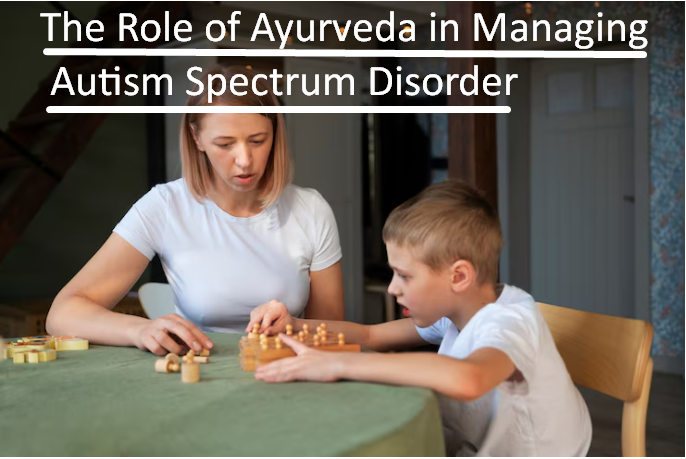Understanding Autism in Ayurveda
Autism Spectrum Disorder (ASD) is described in Ayurveda as a condition that primarily involves an imbalance in the Vata dosha, which is responsible for movement and nervous system functioning. According to Ayurvedic principles, individuals with autism typically exhibit symptoms of Vata imbalance, such as impaired sensory perception, irregular sleep patterns, and difficulty in communication and social interactions.
In Ayurveda, autism is believed to be caused by a combination of genetic, environmental, and lifestyle factors that disrupt the balance of the doshas in the body. Factors such as improper diet, exposure to toxins, and stress are considered to aggravate Vata dosha and contribute to the manifestation of autistic symptoms.
Ayurvedic texts suggest that treatment for autism involves a holistic approach that focuses on balancing the doshas, strengthening the nervous system, and improving overall health and well-being. This approach typically includes customized herbal formulations, dietary modifications, lifestyle changes, and specific therapies such as Panchakarma to help alleviate symptoms and improve quality of life for individuals with autism.
Ayurvedic practitioners may also recommend practices such as yoga, meditation, and pranayama to help calm the mind, reduce anxiety, and improve focus and concentration in individuals with autism. These practices are believed to have a positive impact on the nervous system and help promote overall emotional and mental well-being.

Understanding autism through the lens of Ayurveda provides valuable insights into the underlying causes and imbalances that contribute to the condition. By addressing these root causes and rebalancing the doshas, Ayurveda offers a natural and holistic approach to managing autism and supporting individuals in leading healthier and more fulfilling lives.
Ayurvedic Assessment and Diagnosis of Autism
Ayurveda, the ancient Indian system of medicine, provides a holistic approach to assess and diagnose autism spectrum disorder (ASD). In Ayurveda, the assessment of autism involves a comprehensive evaluation of the individual’s physical, mental, and emotional health. Ayurvedic practitioners consider various factors such as the individual’s constitution (Prakriti), imbalances in the body’s three doshas (Vata, Pitta, Kapha), the state of the digestive system (Agni), and overall lifestyle habits.
Key aspects of Ayurvedic assessment and diagnosis of autism include:
- Prakriti Analysis: Identifying the individual’s unique biological constitution through a detailed assessment of physical and psychological characteristics.
- Dosha Imbalance: Assessing the balance of Vata, Pitta, and Kapha doshas to understand how imbalances may be contributing to the symptoms of autism.
- Agni Evaluation: Examining the digestive fire (Agni) to determine its strength and efficiency, as impaired digestion can lead to the accumulation of toxins (ama) in the body.
- Assessment of Mental State: Evaluating the individual’s mental state, emotional well-being, and cognitive functions to gain insights into their overall mental health.
- Lifestyle and Behavior Analysis: Analyzing the individual’s lifestyle habits, dietary patterns, sleep routines, and behavior patterns that may be influencing their condition.
Ayurvedic diagnosis of autism is based on a holistic understanding of the individual’s unique constitution, doshic imbalances, and lifestyle factors. By identifying the root causes of imbalance and addressing them through personalized treatment approaches, Ayurveda aims to restore harmony to the body, mind, and spirit of individuals with autism spectrum disorder.
Ayurvedic Treatment Approaches for Autism
Ayurveda offers a holistic approach to managing Autism Spectrum Disorder (ASD) by addressing the mind, body, and spirit. Here are some key treatment approaches within Ayurveda:

- Panchakarma Therapy: Ayurvedic detoxification procedures like Panchakarma can help eliminate toxins from the body, promoting overall well-being and balance.
- Herbal Remedies: Ayurvedic herbs such as Brahmi, Ashwagandha, and Shankhpushpi are believed to have calming and balancing effects on the nervous system, which can be beneficial for individuals with ASD.
- Dietary Modifications: Ayurveda emphasizes the importance of a sattvic diet, which includes fresh fruits, vegetables, whole grains, and nuts. Avoiding processed foods and incorporating digestive spices like cumin and ginger can support digestion and overall health.
- Yoga and Meditation: Practices like yoga and meditation can help calm the mind, reduce anxiety, and improve focus and concentration, which are beneficial for individuals with ASD.
- Lifestyle Recommendations: Ayurveda recommends establishing a daily routine (dinacharya) that includes adequate rest, regular exercise, and stress management techniques to promote balance and well-being.
- Individualized Approach: One of the strengths of Ayurveda is its individualized approach to treatment. Ayurvedic practitioners assess each person’s unique constitution (prakriti) and imbalances (vikriti) to tailor treatment plans accordingly.
- Consultation with a Qualified Practitioner: It is essential to consult with a qualified Ayurvedic practitioner who has experience in treating individuals with ASD to create a comprehensive and personalized treatment plan.
By incorporating these Ayurvedic treatment approaches, individuals with Autism Spectrum Disorder may experience improvements in their symptoms and overall quality of life.
The Role of Diet and Nutrition in Ayurvedic Autism Treatment
Ayurveda emphasizes the importance of diet and nutrition in managing autism spectrum disorder. The food we consume plays a significant role in our overall health and well-being, including our mental health. In Ayurveda, each individual is unique, and the approach to diet and nutrition is personalized based on their unique constitution or dosha.

- Balancing Doshas: Ayurvedic principles suggest that imbalances in the doshas can contribute to autism symptoms. By following a diet that helps balance the doshas, individuals with autism may experience improvements in their symptoms.
- Avoiding Trigger Foods: Certain foods are known to aggravate imbalances in the doshas and may worsen autism symptoms. These trigger foods vary depending on an individual’s dosha and specific sensitivities. In Ayurveda, it is recommended to avoid these trigger foods to support overall well-being.
- Emphasizing Nutrient-Dense Foods: Ayurveda encourages the consumption of fresh, whole foods that are nutrient-dense to support physical and mental health. Including a variety of fruits, vegetables, whole grains, and healthy fats in the diet can provide essential nutrients for individuals with autism.
- Herbal Supplements: In addition to dietary changes, Ayurvedic practitioners may recommend herbal supplements to support the overall health of individuals with autism. These supplements are chosen based on the individual’s dosha and specific needs.
- Mindful Eating Practices: Ayurveda also emphasizes the importance of mindful eating practices. Taking the time to eat meals slowly, in a peaceful environment, and focusing on the sensory experience of eating can support digestion and overall well-being.
By incorporating Ayurvedic principles of diet and nutrition into the treatment plan for autism spectrum disorder, individuals may experience improvements in their symptoms and overall quality of life.
Herbal Remedies for Autism in Ayurveda
Ayurveda offers various herbal remedies that can be beneficial in managing symptoms of autism spectrum disorder. Here are some common herbal remedies recommended in Ayurvedic practice:

- Brahmi (Bacopa monnieri): Brahmi is known for its cognitive-enhancing properties and may help improve memory, focus, and overall brain function in individuals with autism.
- Ashwagandha (Withania somnifera): Ashwagandha is an adaptogenic herb that can help reduce stress and anxiety levels in individuals with autism, promoting a sense of calm and relaxation.
- Shankhpushpi (Convolvulus pluricaulis): Shankhpushpi is often used to improve cognitive function, promote relaxation, and support overall brain health, which can be beneficial for individuals with autism.
- Jatamansi (Nardostachys jatamansi): Jatamansi is known for its calming properties and can help alleviate behavioral issues such as aggression and hyperactivity in individuals with autism.
In Ayurveda, these herbs are often used in combination with other natural ingredients to create personalized herbal formulations tailored to the individual’s specific needs and constitution. It is important to consult a qualified Ayurvedic practitioner before incorporating herbal remedies into an autism management plan to ensure safety and efficacy.
By leveraging the healing properties of these herbal remedies, individuals with autism spectrum disorder can potentially experience improved well-being and quality of life.
Panchakarma Therapy for Autism
Panchakarma therapy is a key component of Ayurveda that involves a series of detoxification and rejuvenation treatments. In the context of autism spectrum disorder (ASD), Panchakarma therapy can be beneficial in managing certain symptoms and improving overall well-being.
- Detoxification: Panchakarma therapy focuses on eliminating toxins from the body through procedures like Vamana (emesis), Virechana (purgation), and Basti (enema). By removing accumulated toxins, it is believed to help restore balance to the body and mind.
- Balancing Doshas: According to Ayurveda, imbalances in the three doshas (Vata, Pitta, Kapha) can contribute to various health issues, including those related to ASD. Panchakarma therapies aim to balance these doshas through personalized treatment plans.
- Improving Digestion: Digestive issues are common among individuals with ASD. Panchakarma therapies include dietary modifications, herbal supplements, and treatments like Snehana (oleation) and Swedana (sudation) to improve digestion and nutrient absorption.
- Stress Reduction: Individuals with ASD often experience heightened levels of stress and anxiety. Panchakarma therapy incorporates relaxation techniques, oil massages, and meditation to help calm the mind and reduce stress levels.
- Enhancing Cognitive Function: Some Panchakarma therapies, such as Shirodhara (oil pouring on the forehead) and Nasya (nasal administration of oils), are believed to enhance cognitive function and promote mental clarity, potentially benefiting individuals with ASD.
Overall, Panchakarma therapy, when integrated into a comprehensive treatment plan for individuals with autism spectrum disorder, may offer a holistic approach to addressing symptoms, improving quality of life, and promoting overall well-being. Its emphasis on personalized care and natural healing align well with the principles of Ayurveda in managing ASD.
Yoga and Meditation for Children with Autism
Yoga and meditation can be beneficial practices for children with autism spectrum disorder. These practices can help children with autism in various ways, such as improving focus, reducing anxiety, promoting relaxation, and enhancing emotional regulation. Here are some key points to consider regarding yoga and meditation for children with autism:
- Improved Focus: Yoga poses and meditation techniques can help children with autism improve their focus and attention span, which can be challenging for some individuals with ASD.
- Reduced Anxiety: Engaging in yoga and meditation practices can help children with autism manage feelings of anxiety and stress. These practices promote a sense of calm and relaxation, which can be beneficial for children with ASD.
- Promotes Relaxation: Yoga and meditation techniques encourage relaxation in both the body and mind. This can be particularly helpful for children with autism who may experience heightened levels of stress or sensory overload.
- Enhanced Emotional Regulation: Yoga and meditation can help children with autism regulate their emotions and respond to challenging situations more effectively. These practices teach valuable coping mechanisms that children with ASD can use in their daily lives.
Incorporating yoga and meditation into the daily routine of children with autism can have positive effects on their overall well-being. These practices can be adapted to suit the individual needs and preferences of each child, making them a valuable tool in managing symptoms of autism spectrum disorder.
Ayurvedic Lifestyle Practices for Autism Management
Ayurveda emphasizes the importance of a holistic approach to managing autism spectrum disorder (ASD). Incorporating specific lifestyle practices can help individuals with ASD achieve better balance and overall well-being. Here are some Ayurvedic lifestyle practices that can be beneficial for managing autism:

- Establishing Routine: Creating a consistent daily routine can provide a sense of structure and stability for individuals with ASD, helping to reduce anxiety and improve overall functioning.
- Balanced Diet: Following a diet tailored to individual constitution (dosha) can support overall health and well-being. Including warm, cooked foods and avoiding processed foods can help maintain digestive balance.
- Proper Sleep: Adequate and restful sleep is essential for individuals with ASD. Establishing a calming bedtime routine and ensuring a comfortable sleep environment can promote better sleep quality.
- Mind-Body Practices: Incorporating mindfulness techniques, yoga, and meditation can help reduce stress and anxiety, promoting a sense of calm and relaxation.
- Herbal Remedies: Ayurvedic herbs such as Brahmi and Ashwagandha may help support cognitive function and reduce anxiety in individuals with ASD. However, it is essential to consult a qualified Ayurvedic practitioner before using any herbal remedies.
By incorporating these Ayurvedic lifestyle practices, individuals with ASD can experience improvements in their overall well-being and quality of life. Moreover, consulting an Ayurvedic practitioner for personalized guidance and treatment can further enhance the management of autism spectrum disorder.
Managing Sensory Issues through Ayurveda
Ayurveda offers a holistic approach to managing sensory issues in individuals with autism spectrum disorder (ASD). By balancing the doshas and promoting overall well-being, Ayurvedic practices can help alleviate sensory sensitivities commonly experienced by those with ASD.
- Dosha Balancing: Ayurveda identifies three doshas – Vata, Pitta, and Kapha – that govern various bodily functions. Imbalances in these doshas can contribute to sensory issues in individuals with ASD. Ayurvedic treatments aim to restore harmony among the doshas through diet, lifestyle modifications, and herbal remedies.
- Herbal Remedies: Ayurvedic herbs such as ashwagandha, brahmi, and shankhpushpi are known for their calming and grounding properties. These herbs can help reduce sensory overload and promote relaxation in individuals with ASD. Incorporating these herbs into a daily routine can provide relief from sensory challenges.
- Oil Massage (Abhyanga): Abhyanga, or oil massage, is a therapeutic technique used in Ayurveda to calm the nervous system and improve sensory processing. Massaging the body with warm herbal oils can enhance sensory integration and promote a sense of calmness and well-being in individuals with ASD.
- Yoga and Meditation: Yoga and meditation practices are an integral part of Ayurveda and can be beneficial for managing sensory issues in individuals with ASD. Mindful movement and breathing exercises can help improve body awareness, reduce anxiety, and enhance sensory regulation.
- Sensory-friendly Diet: Ayurveda emphasizes the importance of a balanced and nourishing diet to support overall health and well-being. Incorporating sensory-friendly foods such as cooked vegetables, whole grains, and warm soups can help maintain digestive health and promote sensory balance in individuals with ASD.
Incorporating Ayurvedic principles and practices into the daily routine can help individuals with ASD better manage sensory issues and improve their overall quality of life. Each person is unique, so it is essential to consult with a qualified Ayurvedic practitioner to create a personalized plan that addresses specific sensory needs and promotes holistic wellness.
Supporting Emotional Well-being in Autism with Ayurveda
- Ayurveda emphasizes the importance of emotional well-being in individuals with autism spectrum disorder.
- By understanding the unique mind-body constitution of each individual, Ayurveda can help identify imbalances that may be contributing to emotional challenges.
- Practitioners of Ayurveda can recommend personalized holistic approaches to support emotional stability and well-being in individuals with autism.
- Ayurvedic therapies, such as Abhyanga (oil massage) and Shirodhara (pouring of warm oil on the forehead), can help calm the nervous system and promote relaxation.
- Herbal remedies and dietary recommendations tailored to the individual’s constitution can also play a significant role in managing emotional issues associated with autism.
- Ayurvedic lifestyle practices, including mindfulness, yoga, and meditation, can support emotional regulation and overall mental health in individuals with autism.
- By addressing emotional well-being through a holistic approach, Ayurveda can complement conventional therapies to enhance the quality of life for individuals with autism.

One thought on “The Role of Ayurveda in Managing Autism Spectrum Disorder”